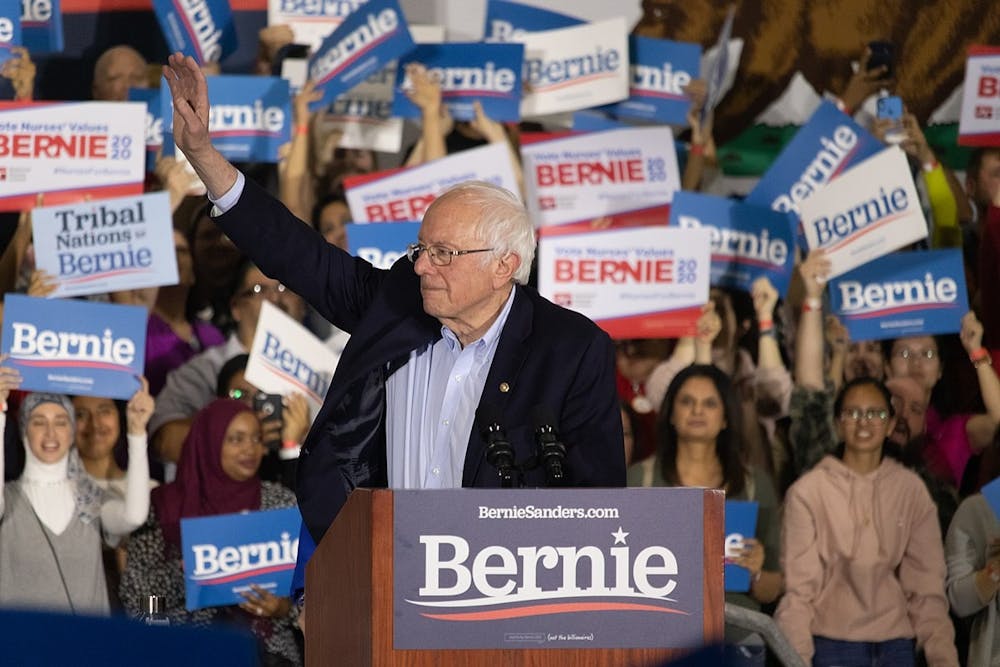Sen. Bernie Sanders’s candidacy invites criticism. His proposed spending agenda totals $68 trillion over ten years and he plans to increase taxes on the middle class. His infatuation with oppressive communist regimes in Cuba and Russia would make U.Va. Students United proud. For many conservatives, libertarians, independents and moderate Democrats, such aspects of Sanders’s candidacy render him utterly unpalatable. However, many non-college educated, working class voters on the left have supported him both in 2016 and during the current Democratic primary process. He has done an excellent job of branding himself as a populist candidate willing to stand up to corporate interests and fight for the common man and woman. Despite this, his immigration policy would undermine the economic security of many working class Americans.
His proposals to decriminalize illegal border crossings and provide taxpayer-funded healthcare and college education to undocumented immigrants would only encourage a mass influx of workers to compete with native-born Americans for low-skilled jobs. Coupled with the challenges many of these communities face already, such as failing schools, a drug epidemic and the stagnation of employment opportunity, such a policy would destroy these communities.
According to a 2006 study published by the National Bureau of Economic Research, researchers found that “as immigrants disproportionately increased the supply of workers in a particular skill group, the wage of black workers in that group fell, the employment rate declined, and the incarceration rate rose.” Another 2017 study of the impact of low-skilled immigrants in the Miami area found similar devastating effects on South Florida’s working class community. George Borgas, the Harvard economist who led these studies, provided a compelling analysis of his findings from 30 years of studying immigration. He concludes that while the net impact of immigration on natural-born Americans remains neutral from a fiscal standpoint, this results from the impacts largely benefiting employers and hurting employees — especially low-skilled workers.
To argue that Sanders’s immigration policy undermines working class job security and wage growth does not discount the positive aspects that many immigrants contribute to American society. Those on the right, including President Donald Trump, have used incendiary language that compounds the left’s narrative that the conservative movement is inherently anti-immigrant. On the other hand, politicians on the left enjoy the politically correct stance of standing against “xenophobia” while being financed by big business interests that view mass low-skilled immigration as an opportunity to skirt minimum wage and working condition regulations. Other insights into Democratic politics reveal an interest in defending immigration policies such as DACA as a means of guaranteeing electoral success. In other words, Democratic operatives like Jennifer Palmieri are more interested in importing new voters than earning the support of the American electorate.
Voters must reject both extreme attitudes and think pragmatically about an immigration policy that not only benefits the United States but also ensures our nation remains an attractive destination for migrants. Trade deals such as NAFTA and the unqualified embrace of globalism have decimated so many working-class communities across the country. The unregulated flow of low-skilled immigrants into the United States poses yet another threat to the health of such communities, and its effects impact other aspects of our society as well.
Discussions on immigration reform must take this into account. Since those in power tend to enjoy greater economic security than those not in control of our nation’s government and corporations, the effects of immigration on low-skilled employees means little as long as their bottom lines do well. However, if the United States is to work for economic structures and policies that give everyone a fair chance at success, policymakers and voters cannot ignore the needs of the working class and the already disadvantaged.
Sanders knows this. Throughout his political career, he worked against immigration policy designed to undermine working-class Americans and has often voted with Republicans on immigration bills he viewed as threats to workers’ job security — such as the 2007 immigration bill. While Sanders enjoys a reputation of integrity among voters, his flip on immigration policy reveals he is just as willing as any other politician to undermine certain communities to obtain power. However, since he became interested in winning the Democratic presidential nomination, his proposals have changed as he needs to appeal to the broader liberal electorate.
Those in the media often criticize voters for acting “against their interests” in supporting certain candidates. Such attitudes reduce the complex motives behind participation in the political process, and I am not making the argument that working class voters are necessarily going against their personal interests in supporting Sanders. Voters may find his climate agenda, healthcare plan or other policy proposals the primary reason for their support of him. I am, however, arguing that his proposed immigration policies would weaken the economic condition of the working class Americans he purports to support.
Should Sanders win the Democratic nomination, I look forward to him debating President Trump over who of them would best defend American workers against the structures designed to stagnate their wages and weaken their job security.
Tom Ferguson is an Opinion Columnist for The Cavalier Daily. He can be reached at t.ferguson@cavalierdaily.com.
The opinions expressed in this column are not necessarily those of The Cavalier Daily. Columns represent the views of the authors alone.







